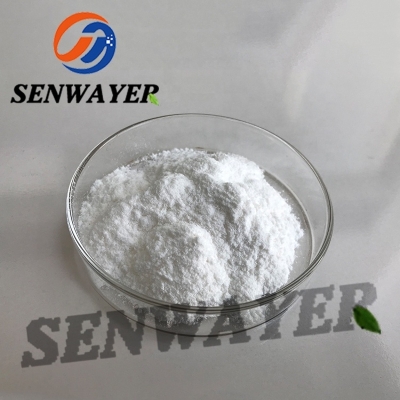-
Categories
-
Pharmaceutical Intermediates
-
Active Pharmaceutical Ingredients
-
Food Additives
- Industrial Coatings
- Agrochemicals
- Dyes and Pigments
- Surfactant
- Flavors and Fragrances
- Chemical Reagents
- Catalyst and Auxiliary
- Natural Products
- Inorganic Chemistry
-
Organic Chemistry
-
Biochemical Engineering
- Analytical Chemistry
- Cosmetic Ingredient
-
Pharmaceutical Intermediates
Promotion
ECHEMI Mall
Wholesale
Weekly Price
Exhibition
News
-
Trade Service
Systemic lupus erythematosus (SLE, image source: medindia.
net)
August 06, 2021/Bio Valley BIOON/ --AstraZeneca recently announced that the U.
S.
Food and Drug Administration (FDA) has approved Saphnelo (anifrolumab-fnia), which is a first -in-class) Type I interferon receptor (IFNAR) antibody for the treatment of moderate to severe adult patients with systemic lupus erythematosus (SLE) who are receiving standard treatment
.
It is worth mentioning that Saphnelo marks the first regulatory approval for a type I interferon (type I IFN) receptor antagonist, and it is also the only new therapy approved by the US FDA for SLE in the past 10 years
.
Type I IFN plays a central role in the pathophysiology of lupus, and the increase in type I IFN signaling is associated with an increase in disease activity and severity
SLE is the most common type of lupus, affecting up to 300,000 people in the United States
.
The disease is a complex autoimmune disease that can affect any organ.
The active pharmaceutical ingredient of Saphnelo is anifrolumab, which is a fully human monoclonal antibody that binds to type I interferon receptor subunit 1, blocking the activity of all type I interferons including IFNα, IFNβ and IFN-ω
.
Type I interferon is a cytokine involved in the inflammatory pathway
This approval is based on the efficacy and safety data of the Saphnelo clinical development project, including 2 TULIP Phase 3 trials and 1 MUSE Phase 2 trial
.
The results of the TULIP-2 test were published in the New England Journal of Medicine in January 2020, and the results of the TULIP-1 test were published in The Lancet-Rheumatology in December 2019.
Rheumatology), MUSE test results were published in "Arthritis & Rheumatology" in November 2016
In these trials, patients received standard treatment.
Compared with the placebo group, a higher proportion of patients in the Saphnelo treatment group experienced a reduction in the disease activity of the entire organ system including the skin and joints, and achieved oral corticosteroids.
Dr.
Richard Furie, the principal investigator of the Saphnelo clinical development project and the director of the Department of Rheumatology at Northwell Health in New York, said: "Our goal in the treatment of systemic lupus erythematosus is to reduce disease activity and prevent the disease itself or the drug from affecting the organs.
Damage, especially steroids, improve the quality of life
.
Today’s approval of anifrolumab represents a big step forward for the entire lupus community
Mene Pangalos, Executive Vice President of R&D of AstraZeneca Biopharmaceuticals, said: “Today’s milestone approval of Saphnelo is AstraZeneca’s pioneering experience in the type I interferon pathway (the core driver of the pathophysiology of systemic lupus erythematosus) over the years.
The culmination of research
.
This pioneering drug has the potential to meaningfully improve the lives of patients with systemic lupus erythematosus
The status quo of SLE in China: Two new drugs are on the market-Benlysta and Taiai
SLE is a chronic autoimmune disease.
The immune system attacks the body's healthy tissues.
If the disease is not controlled, it will cause a series of symptoms, including pain, rash, fatigue, critical swelling, fever, long-term organ damage, and even premature Death, the disease will also have a huge impact on the patient's physical and mental health
In 2011, GlaxoSmithKline Benlysta (Belitum, generic name: belimumab, belimumab) was approved by the United States and the European Union for the treatment of adult patients with autoantibody-positive SLE, becoming the first new drug for the treatment of SLE in the past 60 years
.
In December 2020 and May 2021, Benlysta was approved by the United States and the European Union for the treatment of lupus nephritis (LN)
.
With the approval of the new indication for LN, Benlysta became the first and only biological agent approved for the treatment of SLE and LN at the same time.
Saphnelo has a different mechanism of action than Benlysta.
The latter is the first specific inhibitor of B lymphocyte stimulating factor (BLyS), which can block the binding of soluble BLyS (a B cell survival factor) to the BLyS receptor on B cells
.
Benlysta does not directly bind to B cells, but by binding to BLyS, Benlysta can inhibit the survival of B cells (including autoreactive B cells) and reduce the differentiation of B cells into plasma cells that produce immunoglobulins
.
Benlysta can reduce the number of abnormal B lymphocytes that make lupus worse.
These abnormal B lymphocytes can cause cells produced by the immune system to mistakenly attack blood vessels and other healthy tissues, causing lupus and other immune system diseases
.
In China, Benlysta (trade name: Beliteng) was approved by NMPA in July 2019
.
As the world's first biological agent approved for the treatment of SLE, Britton was approved to be combined with conventional treatment in China this time, and it is suitable for adults with active and autoantibody positive SLE with high disease activity on the basis of conventional treatment.
Patient
.
Believumab is a fully human monoclonal antibody that is administered intravenously to inhibit B cell proliferation and differentiation, and induce autoreactive B cell apoptosis, thereby reducing autoantibodies in serum and achieving the purpose of treating SLE
.
It is worth mentioning that in March 2021, Rongchang Biopharmaceuticals announced: the world's first "dual target" class of new biological drug for the treatment of systemic lupus erythematosus (SLE)-Tai'ai (generic name: Taitaxipu) ) Has been approved by the National Food and Drug Administration, and it is also the first domestically-made dual-target Class I new drug approved for marketing in China in 60 years
.
The special thing about Taltazep is that it can simultaneously target two key cytokines, BLyS and APRIL
.
Studies have found that BLyS and APRIL are key factors for abnormal B cell maturation and differentiation, and the levels of BLyS and APRIL in patients with SLE determine the severity of the disease
.
By inhibiting BLyS and APRIL, it can completely inhibit the signal pathway of abnormal B cells, effectively reduce the body's autoimmune response, and achieve the purpose of treating SLE
.
(Bioon.
com)
Original source: Saphnelo (anifrolumab) approved in the US for moderate to severe systemic lupus erythematosus
Original source: Saphnelo (anifrolumab) approved in the US for moderate to severe systemic lupus erythematosus






